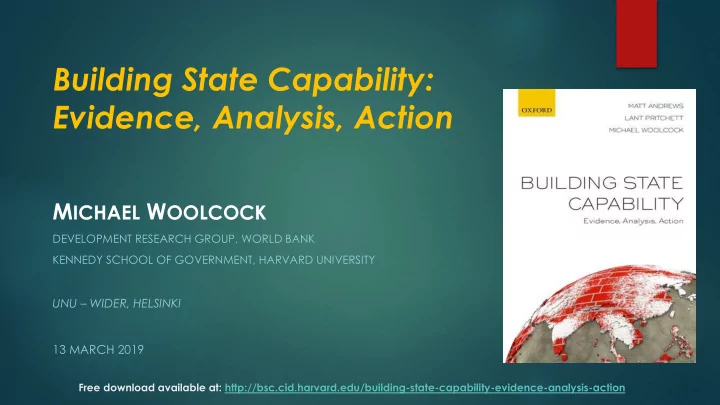

Building State Capability: Evidence, Analysis, Action M ICHAEL W OOLCOCK DEVELOPMENT RESEARCH GROUP, WORLD BANK KENNEDY SCHOOL OF GOVERNMENT, HARVARD UNIVERSITY UNU – WIDER, HELSINKI 13 MARCH 2019 Free download available at: http://bsc.cid.harvard.edu/building-state-capability-evidence-analysis-action
Earlier generations made similar claims. How might this time be different? PDIA as a “perpetual second word” on implementation capability Cf. first word: deep originality • Cf. final word: QED • [The options presented to us] “ often fits so ill with our own style or is so far removed from it that we can use it at best as a decoration and not as material to build with. … there has been so little to choose from.” Ki Hajar Dewantara, 1935 (Education reformer, Indonesia) Lindblom (1950s), Hirschman (1960s), Rondinelli (1980s), Scott (1990s)… “The term ‘implementation’ understates the complexity of the task of carrying out projects that are affected by a high degree of initial ignorance and uncertainty. Here ‘project implementation’ may often mean in fact a long voyage of discovery in the most varied domains, from technology to politics.” Albert Hirschman (1967: 35) Strong diagnosis, weak proscription, no accompanying ‘social movement’
Earlier generations made similar claims. How might this time be different? So, Building State Capability seeks to: Expand, improve, refine empirics and diagnostics (Part I) Outline a concrete, actionable alternative (Part II) Contribute to building a global social movement Book available online for free, to anyone (~5000 downloads, 150+ countries) Companion training programs available online for free, to anyone In teams of 5-6, with a government official Work with wide array of global partners ‘Doing Development Differently’
Action! ‘Doing development differently’ (DDD) Building State Capability program, Harvard Kennedy School 1. Direct engagements with governments Online and executive training programs Working papers, blogs, etc Applied Research: Document, explain sub-national variation 2. Wide variance in outcomes a ubiquitous feature of complex problems Integrate broad surveys with detailed case studies of how vexing implementation problems were solved Operational Practice: Doing Development Differently ‘movement’ 3. A widening array of alternative ‘adaptive’ approaches to navigating complexity Incorporation into donor, IFI activities
Applied research Key role for evidence in improving implementation quality entails (a) mapping variation in the outcomes a team proposes to navigate (b) explaining where, how, why and for whom such variation occurs (c) sharing insights from local teams that have managed to navigate this tough terrain better than others All done as part of a more focused strategy that begins and ends with helping local professionals, political leaders and citizens respond to problems that they themselves have jointly nominated and prioritized i.e., understanding not just the “effects of causes” but the “causes of effects” Need ‘ecologies of evidence’ to do all this well Diagnostic Country Case Studies Yuan Yuan Ang (2016) How China Escaped the Poverty Trap (Cornell UP)
Wide variation within countries e.g., Health clinic performance. Why? Absenteeism by District, Yemen 0% 20% 40% 60% 80% 100% Algobein 8% 18% Alsawadiah 18% 20% Alhaymah Aldak 20% 20% Mothikerah 23% 24% Alodein 25% 25% Alfaraa 25% 25% Alsadah 27% 27% Mazhar 29% 33% Hobeish 33% 35% Alqoraishiah 38% 38% Yareem 40% 49% Almakhader 50% 50% Manakhah 50% 50% Alqafr 52% 52% Alaymah Alkhar 67% 70% Bani Dhabian 73% 78% Kosmah 80% 82% Alttafah 83%
And in education outcomes (even for the well-off…) Source: Kaffenberger and Pritchett 2017 RISE program: https://www.riseprogramme.org/
Operational practice: DDD ‘movement’ Doing Development Differently (DDD) A proto social movement of senior administrators and front-line practitioners • • Boston (2014), Manila (2015), London (2016), Jakarta (2017), Nairobi (2018), Berlin (2019) Building out the ‘demand side practice’ for substantive change • • Not just the ‘supply side critique’ (from academia) Frontier issues: crafting political and administrative tools • • From ‘architecture’ to ‘engineering’ Global Delivery Initiative (GDI) http://www.worldbank.org/reference/GDI/ • ~40 member organizations: governments, NGOs, think tanks, academia • Case studies on implementation dynamics, problem solving, in projects • See also Princeton’s Innovations for Successful Societies • • https://successfulsocieties.princeton.edu/
‘PDIA’ within, beyond the World Bank 1. Major reports, donor programs World Development Reports Conflict & Security (2012) Behavioral Economics (2015) Governance & Law (2017) Education (2018) Trust, Voice and Incentives: Learning from Local Success Stories in MENA (2015) The Innovation Paradox (2017) DFID (UK), DFAT (Australia), SIDA, NZAid et al 2. In World Bank country programs Indonesia, Nigeria, Sierra Leone, Mozambique, Tajikistan, Cambodia... 3. Adaptive Fellows Program 4. Other organizations IRC, Mercy Corps, R4D, Feedback Labs, RTI, Abt, USAID, global health…
Conclusion: A self-critique (or, enacting “a propensity for self-subversion”) Water pistol in a gun fight? What if prevailing politics too nasty, overwhelming? Adequate administrative ‘plumbing’? Procurement, accounting, etc Securing robust, durable authorizing environment? When political winds shift, staff turnover is high… Discerning ‘good failure’ from design failure, implementation failure When to hold, fold, walk away, run? PDIA-ing PDIA Itself is hard to fully implement…
Recommend
More recommend